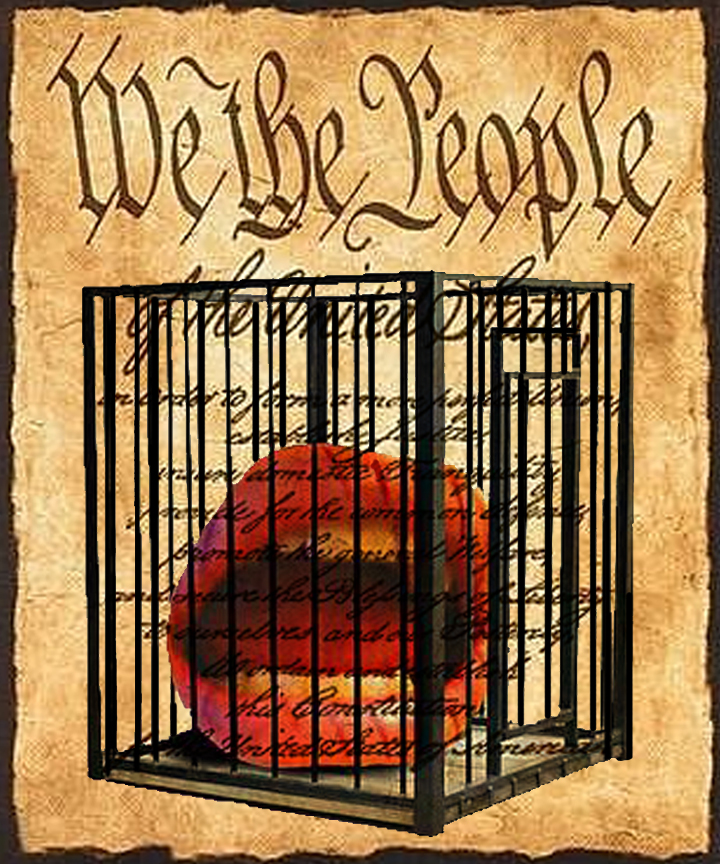
To announce that there must be no criticism of the President, or that we are to stand by the President, right or wrong, is not only unpatriotic and servile, but is morally treasonable to the American public. ― Theodore Roosevelt
“He looks just the way I imagined,” someone exclaimed as the visitor approached the bookstore. He looked just that way to me, too, but then I had seen a photo. So, it wasn’t quite the same.
A university professor, the bald half of his scalp framed by gray wiry hair that has a tendency to shoot up and out as if electrified. He wears a uniform of blue sports coat, a white one-hundred-percent cotton button-down shirt, tan khakis, bland paisley tie and brown moccasin-style loafers. Glasses. In other words, everything but the pointy head.
Just the way you’d imagine a card-carrying member of the American Civil Liberties Union to look. Intellectual, liberal. You know, kinda dangerous. Might’ve even voted for Michael Dukakis. And get this. He hasn’t owned a television in fifteen years. What more proof do you need? How much more out of touch can one get?
Who better than Dr. Samuel Walker to write In Defense Of American Liberties: A History Of The ACLU? A historian, he teaches criminal justice at the University of Nebraska.. He himself participated in events covered in this, his fifth book, as a civil rights worker in Mississippi an as an active opponent to the Vietnam War. Probably before both became fashionable. He’s served on the national board of the ACLU since 1983.

You might question Walker’s ability to document objectively the role of the ACLU in our culture. The author himself harbors no such doubts. “It is impossible for anyone to view history free of values,” Walker notes. “If you believe that people have the right to criticize the government, even in wartime, then you have made a judgment that will affect your view of the history of the ACLU.”
Walker believes it’s our right. Me, I feel it’s our obligation. Helps certainly if you remember that the Bill of Rights exists to restrain the majority.
That’s why the ACLU defended the American Nazi’s right to parade in 1977 through Skokie, a Chicago suburb, nearly half Jewish. The most controversial episode in ACLU history, every court in the land upheld the Union’s position that even the most hateful groups with the most unpopular beliefs are protected by the First Amendment.
The ACLU lost so many members it was plunged into debt. Its very existence was jeopardized by its effort to remind us that free speech must not be limited only to those with whom we agree.
That’s why the ACLU was the only national organization to fight the internment during World War II of Japanese-Americans.
The ACLU was the only one.

That’s why Walker would defend nude dancing as free speech. It’s why he questions automobile confiscation for prostitution offenses. He believes castration for sex offenders is not only unconstitutional but “barbaric.” A civilized society does not lop off precious body parts to control the behavior of its citizens.
Nor does it execute them. “We’re the only allegedly civilized country in the world that has the death penalty,” Walker says, with exasperation. “We are in such select company as China and Iran.” He points out that some eighty percent of the American people support the death penalty. Really?
Walker might mention that many of the folks who detest the ACLU’s pro-life opposition to the death penalty also protest the organization’s support of abortion rights. The contradiction is obvious to many.
Forget what you THINK you know about the ACLU. For example, did you know the ACLU has fought for the rights of anti-abortion activists to picket clinics?
If you doubt “its historic commitment to defend the rights of even its enemies,” witness the ACLU intervention on behalf of three allegedly violent abortion foes.
And I quote. “While we are no more eager than anyone else to have our offices bombed…. We do not wish to be protected against that threat at the expense of the constitutional rights of any citizens.”
Sam Walker feels the future of individual freedoms might well lie with two issues – crime/drugs and abortion. “Americans tend to approach civil rights from a very personal perspective. … There’s an understandable fear about the impact on their lives of crime and drugs, so we see a shift in opinion, a greater tendency to restrict rights.”
Yet, Walker remains “very, very cautiously” optimistic. Don’t focus on the rights’ retreat caused by the War On Drugs, he counsels. Watch the response of individuals to the intrusion of government into their private lives. Watch the political upheaval that follows.
Whatever your position, win or lose, it doesn’t sound pretty. But long term, Walker points out, the controversy will have a positive effect on our nation because the focus will be on liberty.
That’s always been the focus of the ACLU. Free speech was an “unverified rumor” when the ACLU was founded to fight for it seventy years ago.
Our treasured right to privacy wouldn’t exist without the ACLU.
A look at the record. In Defense Of American Liberties shows the ACLU was involved in some eighty-five percent of all landmark cases protecting the rights of American citizens. Our rights. Your rights.
Hell. My rights. The most important rights of all. Right? We all think that, right?
Protecting my right to write this.
Yours, well, to do as you choose with it.
